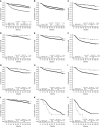Effects of microsatellite instability on recurrence patterns and outcomes in colorectal cancers
- PMID: 27228287
- PMCID: PMC4931375
- DOI: 10.1038/bjc.2016.161
Effects of microsatellite instability on recurrence patterns and outcomes in colorectal cancers
Abstract
Background: Among colorectal cancers (CRCs), high-frequency microsatellite instability (MSI-H) is associated with a better prognosis, compared with low-frequency MSI or microsatellite stability (MSI-L/MSS). However, it is unclear whether MSI affects the prognosis of recurrent CRCs.
Methods: This study included 2940 patients with stage I-III CRC who underwent complete resection. The associations of MSI status with recurrence patterns, disease-free survival (DFS), overall survival from diagnosis to death (OS1), and overall survival from recurrence to death (OS2) were analysed.
Results: A total of 261 patients (8.9%) had MSI-H CRC. Patients with MSI-H CRC had better DFS, compared to patients with MSI-L/MSS CRC (hazard ratio (HR): 0.619, P<0.001). High-frequency microsatellite instability CRC was associated with more frequent local recurrence (30.0% vs 12.0%, P=0.032) or peritoneal metastasis (40.0% vs 12.3%, P=0.003), and less frequent lung (10.0% vs 42.5%, P=0.004) or liver metastases (15.0% vs 44.7%, P=0.01). Recurrent MSI-H CRC was associated with worse OS1 (HR: 1.363, P=0.035) and OS2 (HR: 2.667, P<0.001). An analysis of patients with colon cancer yielded similar results.
Conclusions: Recurrence patterns differed between MSI-H CRC and MSI-L/MSS CRC, and recurrent MSI-H CRCs had a worse prognosis.
Figures


References
-
- Alberts SR, Horvath WL, Sternfeld WC, Goldberg RM, Mahoney MR, Dakhil SR, Levitt R, Rowland K, Nair S, Sargent DJ, Donohue JH (2005) Oxaliplatin, fluorouracil, and leucovorin for patients with unresectable liver-only metastases from colorectal cancer: a North Central Cancer Treatment Group phase II study. J Clin Oncol 23(36): 9243–9249. - PubMed
-
- Asaka S, Arai Y, Nishimura Y, Yamaguchi K, Ishikubo T, Yatsuoka T, Tanaka Y, Akagi K (2009) Microsatellite instability-low colorectal cancer acquires a KRAS mutation during the progression from Dukes' A to Dukes' B. Carcinogenesis 30(3): 494–499. - PubMed
-
- Benatti P, Gafa R, Barana D, Marino M, Scarselli A, Pedroni M, Maestri I, Guerzoni L, Roncucci L, Menigatti M, Roncari B, Maffei S, Rossi G, Ponti G, Santini A, Losi L, Di Gregorio C, Oliani C, Ponz de Leon M, Lanza G (2005) Microsatellite instability and colorectal cancer prognosis. Clin Cancer Res 11(23): 8332–8340. - PubMed
-
- Benson AB 3rd, Venook AP, Bekaii-Saab T, Chan E, Chen YJ, Cooper HS, Engstrom PF, Enzinger PC, Fenton MJ, Fuchs CS, Grem JL, Grothey A, Hochster HS, Hunt S, Kamel A, Kirilcuk N, Leong LA, Lin E, Messersmith WA, Mulcahy MF, Murphy JD, Nurkin S, Rohren E, Ryan DP, Saltz L, Sharma S, Shibata D, Skibber JM, Sofocleous CT, Stoffel EM, Stotsky-Himelfarb E, Willett CG, Gregory KM, Freedman-Cass D (2015) Rectal Cancer, Version 2.2015. J Natl Compr Cancer Netw 13(6): 719–728, quiz 728. - PubMed
-
- Benson AB 3rd, Venook AP, Bekaii-Saab T, Chan E, Chen YJ, Cooper HS, Engstrom PF, Enzinger PC, Fenton MJ, Fuchs CS, Grem JL, Hunt S, Kamel A, Leong LA, Lin E, Messersmith W, Mulcahy MF, Murphy JD, Nurkin S, Rohren E, Ryan DP, Saltz L, Sharma S, Shibata D, Skibber JM, Sofocleous CT, Stoffel EM, Stotsky-Himelfarb E, Willett CG, Gregory KM, Freedman-Cass DA (2014) Colon cancer, version 3.2014. J Natl Compr Cancer Netw 12(7): 1028–1059. - PubMed
Publication types
MeSH terms
LinkOut - more resources
Full Text Sources
Other Literature Sources
Medical
Molecular Biology Databases

